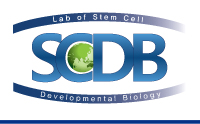Genomic imprinting during reprogramming and redifferentiation

Pluripotent stem cells can differentiate into all cell types and self-renew without losing their differentiation potential. Induced pluripotent stem cells (iPSCs) can be generated from somatic cells by overexpression of certain transcription factors and have the same characteristics as embryonic stem cells (ESCs). During their reprogramming, iPSCs undergo epigenetic changes, including DNA methylation and histone modification, and ultimately acquire an epigenetic state similar to that of ESCs. However, it is unclear whether imprinted genes are maintained or revert back to the parthenogenetic state when iPSCs are redifferentiated into specialised cell types. Here (p. 2516), Jeong Tae Do and colleagues analyse genomic imprinting during reprogramming and redifferentiation by comparing biparental female neural stem cells (fNSCs), parental NSCs (pNSCs) and NSCs that have been obtained by redifferentiation from maternal iPSCs (miPSCs). They show that reprogrammed miPSCs can differentiate into a stable NSC line, and that these cells are very similar to normal fNSCs but not to the donor pNSCs. In particular, they find that some maternally imprinted genes, which are fully methylated in pNSCs, are demethylated in NSCs that have been derived from miPSCs, suggesting that parthenogenetic DNA methylation patterns in imprinted genes are reset following pluripotent reprogramming. These findings might have important implications for the use of iPSCs in stem-cell-based therapies.
- © 2013. Published by The Company of Biologists Ltd





























